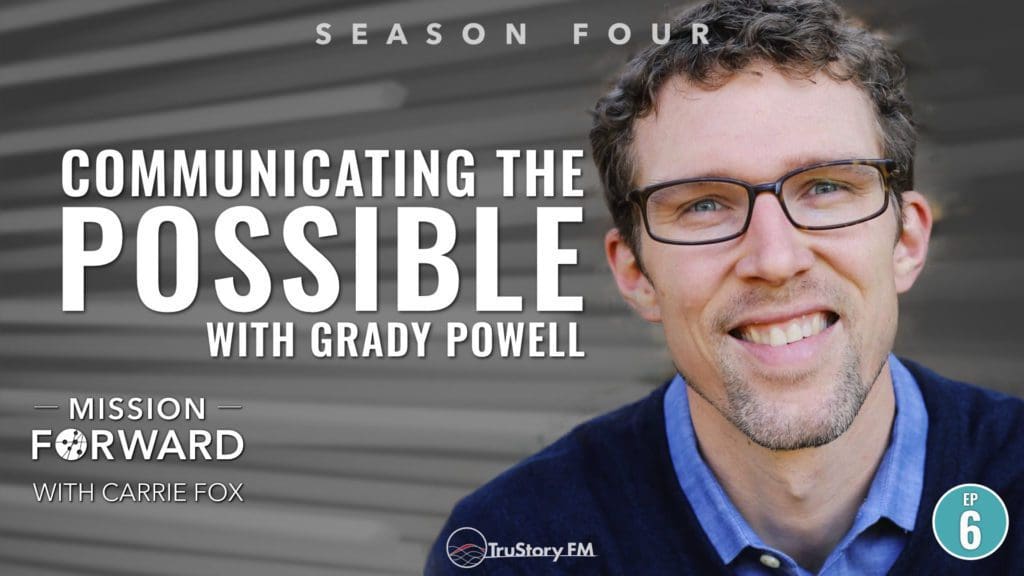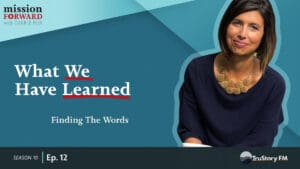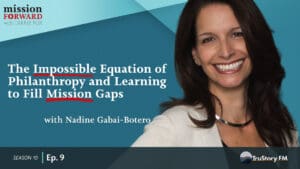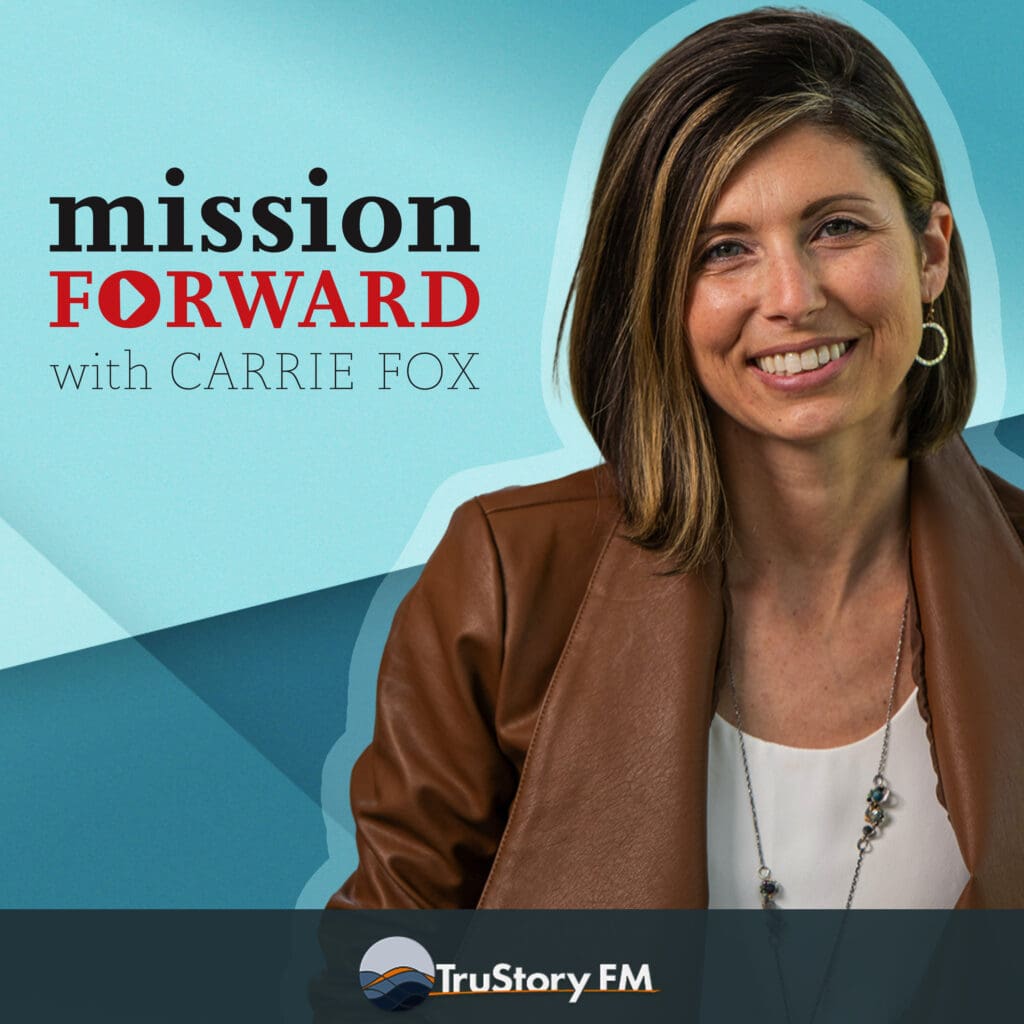This week we welcome Grady Powell, founder of Openfields, a social impact consulting firm committed to helping leaders imagine and implement a more creative and just future. He is also co-founder of Capita, a nonpartisan think tank working to build a better future for children and families.
Following up on last week’s conversation with Greg Galle about communicating the impossible, this week, we take on the world of what’s possible in communications and strategy. We talk with Grady about what it means to work in social impact, how he helps leaders think differently about the actions of their organizations, and how to take ideas to the next level for a more just business environment.
Grady’s work at Openfields and Capita sits at the intersection of research, public policy, social innovation and design and we’re thrilled to be able to bring this conversation to you all this week. Our deepest thanks to Grady Powell and his team for making this conversation happen.
- 00:00 – Welcome to Mission Forward
- 01:35 – Introducing Grady Powell
- 05:46 – What needs to be in place for innovation to happen?
- 11:17 – Diversity in the creative process and communication
- 13:52 – People … first?
- 21:36 – What’s Next?
Episode Transcript
Grady Powell: This is the difference, which I think gets missed in the conversation sometimes, is if every project we start, we have to go run a bunch of focus groups and listen to the community again, it means you haven’t listened yet. My point is, I do believe that people from different backgrounds can listen well, they can learn, and they can understand without having fully experienced or having complete empathy with, they can understand good things to do to serve other people. And that goes in any direction, across all kinds of cultures.
Carrie Fox: All right, hi folks, and welcome to this episode of Mission Forward, where each week we bring you a thought provoking and perspective shifting conversation on the world around us and the role that communications and communicators play in helping us make sense of the world. I’m Carrie Fox, your host and CEO of Mission Partners, a social impact communications firm, and certified B corporation. Today I’ve got someone on the show that I have admired for many years, since our paths first crossed as a result of our shared collaborations with Bill Millikan, founder of Communities in Schools. I have admired Bill’s social justice work for many years. So as soon as I knew Grady was at that table working with him, I was even more interested in getting to know Grady. And so we are welcoming today, Grady Powell, founder of Open Fields, which is a social impact consulting firm, committed to helping leaders imagine and implement a more creative and just future. We’ll talk about what that means. But he’s also co-founder and trustee of Capita, a nonprofit ideas lab working at the intersection of research, public policy, social innovation, design, the arts. There’s a lot of intersections there that they cross into. And at Capita, Grady and his team are exploring how cultural and social transformations, including the one that we are in, in this moment affect young children, and how they take what they learn to foster new ideas that ensure a future in which children and their families flourish. I love that and I want to learn more. So Grady, first, I will just say welcome to Mission Forward. Thanks so much for joining us today and for sharing a little more about this amazing work that you’re doing.
Grady Powell: Thanks Carrie. It’s great to be here and I do remember fondly meeting you with Bill and the kind of energy that he created between us and the shared vision that he cast. Yeah, I’m great to be working toward those ends together.
Carrie Fox: Me too. Like many people that I have come to know and admire in this field of social justice, there’s not just one cool thing that you’re invested in building, but very clearly there are two cool things. So I hope that we could start by just telling me a little more about your journey. What brought you to become founder and CEO of Open Fields, but also founder of Capita. Just bring us along that path with you.
Grady Powell: Well, a lot of my vision for the work that we’re doing now probably begins from a really transformational experience I had back in high school, actually, where a group came into our school and ran a prototype program, at the time called Business Week. It’s now become very popular, but at the time, no one had ever done anything like it. Took us all out of the classrooms, put us on teams, gave us products to design and launch. We had to run investment strategies and develop a brand and pitch to stakeholders. It turned out for me, to be one of those transformational experiences in my life, because it just showed me school can be different. We can learn in different ways. The amount of creative energy that was put into that experience for me was powerful. We got interact with community leaders. I got mentors. It resulted in my first internship. A year later, I was pitching to the CEO of the association that ran it to fund a new media studio in our high school. It was the start of something very entrepreneurial for me. So it was a great experience and since then, I, wherever I go, wherever I’ve worked, I’ve always sort of asked that same sort of question. Which is, a lot of people are stuck in school day, right? Go to school every day. But there are a lot of experiences that, you can redesign it. You can learn in different ways, you can act in different ways, you can collaborate in different ways. I go back to that a lot as the root of a lot of our work today. But the path I think from there, twofold, at a school, I had two sort of careers. One was in advertising. Stepped into the advertising agency for the first time, didn’t know anything about it, but the amount of creative energy in that place, as you know, Carrie, what it’s like. The amount of passionate people from all kinds of disciplines and getting together to solve problems, just motivated me. I said, whatever this is, I want to be a part of it. So I dove in at that ad agency and spent a long time working on brand strategy and leading creative teams and making presentations to clients and measuring impact. It was very fast paced, very creative, high energy. And then my next career was actually helping run a leadership development nonprofit where we were taking young professionals, helping them think about what they valued, helping them think about their future and what kind of impact they wanted to have in the world. And it was a lot of reflection and reading and community building and mentoring, and I loved it. It was awesome. There was so much purpose in that place. A lot of where I came to now is sort of the mix of those two things. I was at that nonprofit, running that nonprofit going, where’s all the money, creative energy, creative talent in this nonprofit space where I find all this purpose? But then the flip side for me was as I reflected back on my agency days, we were selling phone plans and bank loans and MBAs and the purpose wasn’t there. So a lot of this for me, Open Fields, a lot of the vision had always been well, what if we could use all of those creative tools in this space that already has so much purpose in it, or bring that kind of purpose back to a lot of these creative spaces.
Carrie Fox: All right Grady, so coming off that question, sometimes it seems like the hardest thing to communicate is the possibilities, right? It’s easy sometimes for people to see what’s right in front of them, but getting beyond the challenges of the day to that blue sky vision, that can be really hard for people. How do you all help people see beyond that present day to what the possibilities of the future could hold?
Grady Powell: That’s a great question. I think you even named it, which is the idea of the blue sky vision. Most people think there is a vision that needs to be defined, we all need to get on board on, right? And that oftentimes can get paralyzing if it doesn’t look like it’s being realized, or it has to be executed in a very specific way, that can be tough. So one thing we love to do is help executives and executive teams just create a whole portfolio of futures and to do it very quickly. Creating multiple possible futures, not just one thing we want to achieve, but let’s look at the trends. Let’s look at the possibilities, let’s create 5, 6, 7, 10 different visions of what could be possible in the future. And once you start to do that, it begins to unlock all kinds of creative energy. It gets folks to let go of, well, this is what I have to make happen, to begin to realize, I can’t do that on my own. I’m going to have to have other people at the table or you begin to realize, oh, my vision is one, I’m motivated about a lot of these other possibilities too. And I now see that we can do more than I thought was possible in the past. Or that one future that you, that blue sky vision that has a roadblock or two or three in front of it, that you’re getting frustrated on. All of a sudden you look at it, well, let’s, let’s expand it. Let’s look at lots of options and all of a sudden those barriers fall away if you take another path. That’s always the case, that’s reality, there’s always multiple possible futures in front of you. It’s learning how to adapt and manage all of those possible futures at one time, always put you in a position to be creative. There’s always a creative way forward. There’s always a way to move toward your vision without assuming there’s only one way to get there.
Carrie Fox: So that resonates pretty deeply with me. You and I have been on a very similar path having, so for me, having been in the agency world here for a little more than 20 years, and for most of that being, working with nonprofits. What you talk about is what I see every day. That there’s so much energy on the agency side and in the corporate side and that can be harder to see on the nonprofit side. Often, because I think, well, you mentioned at the top that there’s a way that organizations go about their work and it’s hard to reimagine it. It’s hard to see it any other way. Right? As we are going into this season and with our audience, primarily being those who work in the social service sector, but also in the social impact field, what have you learned over time? What do you kind of carry with you forward as you think about what needs to be in place? What kind of conditions need to be in place for innovation to happen? For people to be able to see that something can in fact be reimagined?
Grady Powell: My first answer was basically, it goes back to something that the founder of our agency just said a lot, which was, we are so committed to the customer, we will do anything and we will find a way to get anything done. I could tell all kinds of stories from the agency world in which we went to great lengths to understand the customer, to know the business, to know the communities they’re in, to know what their customers cared about. So it’s a little bit of that, we can do it attitude that if you’re in the nonprofit space, or the policy space for long, that can get beat out of you pretty quickly. It’s just so easy to feel like change is never going to happen. It’s so slow in these environments. People’s minds don’t change, everyone’s entrenched, it’s very polarized. I know that that culture just drags that attitude down. I think so many leaders we work with have that attitude. They care. They work harder than anybody that I know, but how do I remind them that things really can change? And they are the person to lead it. And how do we get out in front of them and help them make a way and how do we get behind them and really energize them? That’s one starting point is just to say, you can get it done. You believe it, I know you do. I’m going to believe in your mission as much as you do and the thing’s going to take off again.
Carrie Fox: So one of the barriers that maybe you need to work through is someone’s own self confidence and belief that they can do it. That the future they envision, they can help work towards that. Do you find that there are any other barriers that stand in leader’s ways of being able to innovate and move towards the future?
Grady Powell: Yeah, it’s related to the first one, is the leaders we work with are successful. They’re not leaders who are struggling. They’re actually leaders who have been successful enough. So I’m not talking about leaders who don’t have a vision. I’m talking about leaders who’s vision has been scaled back just a little bit to be realistic. That’s what I’m talking about. And so it’s actually a leader’s success to date that tends to hold them back or not just the leaders, but their organizations, their boards. We’ve been successful enough. We’ve raised enough money. We’ve had a little more impact than I thought we could. Those are all actually limiting beliefs that if you have a big idea, you want to see a lot of change. That you can’t be satisfied with that. And a lot of leaders we work with aren’t, but they sort of have to be given permission to kind of bring it back out.
Carrie Fox: In a lot of our work we’ve spent a lot of time these last few years coming out of 2020 and into 2021, exploring our own processes and the way we communicate as an agency to really identify a name where white dominant norms show up. And what we know in a lot of agency world, but also in a lot of organizations that it’s pretty common for us to default to the white dominant ways of working and communicating. What I really love about what you’re all doing is you’ve got a really diverse set of stakeholders that you’re working with. So across that set, I suspect that you’re seeing people who have very different ways of gathering and collaborating and communicating. Anything in particular that you would share, knowing that you work across this diverse set of stakeholders, on ways to communicate across barriers or across different viewpoints?
Grady Powell: That’s a great question. Two things that I think we do that, that help bridge a lot of those gaps. One is we really do try to move further out into the future. We’re saying not tomorrow, what are we going to do together or next year? Because in any collaborative setting, when you’ve got diverse viewpoints, something’s going to have to change. A lot of people are coming, they don’t want to, that’s threatening in some way or we’re trying to defend my territory and my funding or my, whatever that might be. So one step to better collaboration is just, let’s talk about 10 years out, 15 years out. We are not even likely going to be working there anymore. Or that major grant you have will long be gone, or all the sort of potential causes of defensiveness or hesitation or lack of trust, we can get beyond that. So that’s one step that I thinks been helpful. Another one is, is that we try to move… So that’s move further on the future. Another one’s just move deeper into our values. We do a lot of root cause analysis work. It’s like, let’s look at the problem, but let’s, don’t look at it from a technical standpoint or a political standpoint. First let’s look at it from what cultural values shape this reality. And once people begin to see that you do, you tend to have more, you don’t always agree, but you tend to have more honest and open conversations about what you value. Other than, getting the immediate wins you’ve predetermined before the conversation even started. I think those are two good tools. Think more creatively and immerse yourself in a different future and think more deeply about what motivates behavior today.
Carrie Fox: So I should preface this by saying, we operate through a people first mindset. We are thinking about people in every decision we make. However, it sounds like it actually would benefit organizations sometimes to remove the people from the equation, just for a little bit. To think about what kind of resources do we need? Do we have the strategy and the pathway to get us to where we need to get? And then do we ultimately have the right people in the right seats to make that happen? But it sounds like what you’re saying is when people think too soon into the future, they still see themselves in it. So they’re caught in that trap of wanting to think about what’s best for the organization, but they’re still at the end of the day, thinking about what’s going to work for me too.
Grady Powell: Yeah. That’s a really good point. That’s a tension I think we run into a lot, which is in any community or social impact work, having diverse voices at the table throughout the process is really critical. But this is the difference, which I think gets missed in the conversation sometimes is if every project we start, we have to go run a bunch of focus for groups and listen to the community again, it means you haven’t listened yet. My point is, I do believe that people from different backgrounds can listen well and they can learn, and they can understand without having fully experienced or having complete empathy with, they can understand good things to do to serve other people. And that goes in any direction across all kinds of cultures. That’s tough. But the idea that we are only going to do listening ad hoc, and that there’s no cumulation of trust and knowledge and insight there, I think gets at what you’re talking about is, if we have to go do that again, it actually undermines the bigger body of work, which is a real community, which operates off of relationships and institutions and partnerships, not just off of individuals. And if it’s always going to operate off of individuals and always going to operate off of personality, then the irony is you’re multiplying the bias factor, right? If it’s just going to be about me and what I want and what I see and what I’ve heard now, then you are actually, you’re leveraging your own bias instead of building an organization or an institution that can collect and cumulate knowledge and trust over time.
Carrie Fox: Yeah. Let’s hang on that listening for a second, because we know that communications goes both ways. It is both about what we say, what people hear, but also how we as the communicator listens or as the leader, how we listen. Who do you think in this, generally speaking, in this time that we are in, who needs to listen more or listen harder?
Grady Powell: I think my first reaction to that is actually, I’m going to take it back to the individuals for a second, which is, I think it’s really important that even in the social impact, social innovation space, it has its own rules. It has its own measures of success. It has ladders you can climb and has awards you can win. We may say it’s not greedy and corporate like other environments are, but it operates on very similar principles often times. And what that makes it hard to do in very competitive, aggressive, productivity driven workplaces, although it’s aimed for a purpose and impact, which I love, it’s really hard to stop listening to yourself actually. I think one of the important things that we’re doing is trying to carve out space for executives in these places to listen again, to what they truly and deeply believe in and believe what’s possible. So that’s a little different answer than you might have expected, but I don’t think we do enough of that. I think there are a lot of people running the race and have a hard time hearing their voice and vision because it’s so noisy, it is a super noisy space. I think that’s really important. And then I guess that becomes the foundation for me, Carrie, for the kinds of listening that does need to happen in the community. In our community I think there’s a lot of CEOs that are listening to national markets and not listening to a lot of the neighborhoods that are being transformed and changed without much input from the community. I think there are a lot of philanthropy and nonprofit leaders that are so busy chasing grants that they don’t actually listen to partners of very good will right across the street. These are all realities I know, you know well
Carrie Fox: Yeah, I love how you just answered that though, because you are so right. People, organizations take so much time building their strategies, building their values and then oftentimes I think act forgetting what those values were. It’s easy to think about corporations who have made missteps based on a lack of maybe remembrance of what their values were. Keeping those values front and center, top of mind, every day is really hard. And so I really love that you started there. I think that’s a great reminder for anyone who’s trying to think about, how do I lead through a difficult time. All the answers you need are right there. If you’ve got values that your organization has agreed on, you’ll find the answers every time in those values.
Grady Powell: I think you’re right about that.
Carrie Fox: I’m going to share a story with you really quick based on something that’s going on at Mission Partners, which is we’ve spent quite a bit of time these last couple years building up, not just our 401k portfolio for our employees, but all the different ways that we could share wealth among our team, across our team and get to a place where every single member of our team is wealth building at Mission Partners. We recently rolled out an impact investing portfolio in a 401k, which is still pretty rare for a small business to do. And there’s not a lot of options, unfortunately, and there’s a lot of legislation that still has to happen for 401ks to be able to have impact investing portfolios. But point is, we rolled it out. We were excited about it. We get into the process and I realize that the funds that we have access to are not really impact driven at all. The reality is these funds are heavied up by some of the corporations that are putting some of the greatest harms against society and yet they are tagged as environmentally responsible because they’re a tech company and so their carbon footprint is low, but their social impact is detrimental. Right? And so it’s really interesting. So what I had to do in a public meeting with my team, I had to say, I guarantee you, team, we will not put dollars into these funds. As a company our values are not aligned with that. And so we’re going to keep work on making sure that this impact investing portfolio is lined up deeply with our values, but that’s a hard thing to do. And to be able to actually live the way you want to live when the options are limited too.
Grady Powell: Yeah. That’s inspiring. Carrie, I’ve always respected, you guys walk the walk. You can be out and lead change from a bunch of abstract ideas, but until you have to do that hard work of challenging the portfolio mix and trying to recreate yourself, that’s hard work. I have a lot of respect for that. Have you had some success? Have you found another way? Are you satisfied yet of what you’ve come to?
Carrie Fox: It’s so interesting. I feel like now to really deeply live this commitment that I have, to be able to track where our dollars are going, one, we do an overview of who are our vendors and are we investing in vendors at are majority bipoc or black led? Are we thinking about every gift we give our employees and supporting small businesses in that process? And then on the portfolio side we might ultimately say, we’re going to have to invest in individual funds to do what we want to do. I think it’s a work in progress to figure out how we’re going to do that in a way that’s truly in line with our values. But these are the same questions that I know you’re getting and working through with your clients, right? Who find themselves at these crossroads and have to figure out, where do I go and how do I get there? And you then are this incredible guide in that process with them. So where I might suggest we wrap up today is what’s on your heart, what’s on your mind as you think about what’s coming ahead and where can we go that makes sure that we can in indeed stay focused on the future? Even in those hard moments, when hard stuff is being faced at us, how do you help folks stay focused on the future?
Grady Powell: How do you keep people focused on the future is a great question. One is, I think we’ve got to start… I think it just these, thinking quite more critically about the future needs to be a discipline that more nonprofits and philanthropists build into their business processes. It’s the evolution you’ve seen in strategic planning from one time strategic plans that are supposed to last three to five years. Which we understand, but a lot of strategic planning now, I think is it’s a core capacity. It’s not a product you produce every four years. In our view, it’s like, we’re helping a lot of groups try to figure out how to do that. What does iterative planning, ongoing process look like? And for us thinking about the future, I think needs to get inserted into that. So it’s not just, okay, how do I adapt to this situation or to this situation, but how do I anticipate? It’s a lot of what we’re trying to do is help executives start to build in that anticipation processes and the knowledge and the business intelligence to keep them out in front. So we’re not in reactive mode all the time. It’s not just a mindset shift. It’s not just a flip of a switch. It’s actually something you have to invest in, and practice and be disciplined at. And if you understand what kind of possibilities it opens up, if you understand how it helps you cross boundaries, if you understand how it gets your ego out of the work. If you understand how it can help inspire team and community, then the investment you’re making in that process, I think is, it’s obvious at that point, right?
Carrie Fox: It makes me think, coming back to where we started that in terms of communications, strategy is a verb much more than it is a noun. It’s not a document you create and set aside, it’s a mindset, it’s a practice.
Grady Powell: Absolutely. I think people have tools to do strategy. They don’t have as many tools to think critically about the future. And so then we would like to see more organizations embrace.
Carrie Fox: That’s awesome. Well, Open Fields is doing amazing work. I’ve gotten to see the end results a few times now and know that it’s transformational. So Grady, thank you so much for the work you’re doing and for being with us today.
Grady Powell: Thanks a lot, Carrie.
Carrie Fox: Mission Forward is produced with support of [Nima Haroon 00:25:20] and the Mission Partners team in association with true story FM. Engineering by Pete Wright, music this week is by Ian Post and Josh Leak. If your podcast app allows ratings and reviews, we hope you’ll consider doing just that for our show. But the best thing you can do to support Mission Forward is simply to share this show with a friend or a colleague. Thanks for your support and we’ll see you next time.











